In this photo taken Monday, Nov. 9, 2015, a Kenyan Muslim woman wearing a niqab, right, looks across as a Kenyan Christian woman, left, buys corn at a street market in Garissa, eastern Kenya. This Kenyan town in which Islamic extremists killed nearly 150 at a college of mostly Christian students in April offers a snapshot of what France and Lebanon, both targeted in recent attacks, and other countries face - the challenge of harmonizing Christian-Muslim relations at a time of danger from extremists - an issue that Pope Francis is expected to address during his trip Nov. 25-30 to Kenya, Uganda and the Central African Republic. (AP Photo/Ben Curtis)
The Associated Press
GARISSA, Kenya (AP) - As song and prayer drifted from the open, ivy-lined doorways of a Catholic church in Garissa, several security officials, including Muslims, stood watch on the grounds nearby.
Their presence was a reminder of the violence that hit this Kenyan town in April, when Islamic extremists killed nearly 150 people at a college of mostly Christian students. Yet it was also a sign, they said, that interfaith relations had improved - the men were relaxed and smiling, and all but one were in plain clothes. After the service ended, they chatted jovially with the priest.
""Welcome, welcome! Feel free!" one official, Omar Tawane, said to an Associated Press reporter, as though eager to get the word out that Garissa was no longer a place of fear and suspicion. Tawane, the regional prison commander and a Muslim, was doing the rounds on foot near St. Peter's Catholic Church, which is next to the high walls of a prison.
Tawane said townspeople are quick these days to inform authorities of any suspicious activity and are united against their common enemy: al-Shabab, the Somali group that carried out the attack. But he acknowledged the threat of militant infiltration remains.
"We cannot say they are not around. We don't know," he said.
Garissa offers a snapshot of what France and Lebanon, both targeted in recent attacks, and other countries face - the challenge of harmonizing Christian-Muslim relations at a time of danger from extremists. The issue is one Pope Francis is expected to address during his trip this week to Kenya, Uganda and the Central African Republic, where Christian-Muslim violence is flaring.
While the pope won't visit Garissa, the attack is likely to be a backdrop, especially when he meets with youth on Friday.
"One of the motives for going to Africa is to bring a message of peace and reconciliation," said the Vatican spokesman, the Rev. Federico Lombardi. "These are young people who need to be encouraged, and urged to look forward in a situation where it isn't easy to live out their Christian experience."
Garissa, 225 miles (365 kilometers) east of the capital, Nairobi, lies in a mostly Muslim area. But the country is about 80 percent Christian. Decades ago, Kenya clamped down here on ethnic Somalis seeking union with Somalia. Some residents say the government still has not invested enough in what a British administrator described in 1963 as "one of the poorest places that people have ever quarreled about."
Camels amble and makeshift canvas dwellings dot the scrubland outside Garissa; officials scan traffic at a bridge checkpoint on the edge of town. On a recent afternoon, youths played soccer in a dusty area where seven months ago security forces displayed the corpses of the school attackers to crowds.
Survivors of the attack said the gunmen fired indiscriminately but also asked some students what faith they belonged to first. At the time, Francis condemned the act of "senseless brutality," using similar language as for the attacks in Paris that killed 130 people.
Yet for the mostly Christian survivors of the daylong rampage in the college by four gunmen, forgiving is easier than forgetting.
"We try to forget, but it's just coming now, the memories, especially when you remember friends you used to be with," Joyce Kioyi, a 21-year-old student who survived the slaughter, said by telephone from her home in the town of Embu. The Paris attacks, she said, "just reminded me about what happened on the second of April."
The Rev. Nicholas Mutua, a local Catholic priest, welcomed the deployment of police to guard Garissa churches during services and noted that the Bible and the Quran carry similar messages of tolerance. But he also said the fear of attack undermines the right to worship in peace.
"We don't have freedom," he said as he sat on a doorstep in the compound of the Our Lady of Consolation Church, where extremists injured several people with grenades in 2012. Just across the street stands the Ibnu Mubarak institute for Shariah and other studies.
Some Muslims also feel like targets in Kenya. At a Nairobi meeting in October, Muslim leaders expressed concern about alleged extrajudicial killings and disappearances by security forces during operations against suspected al-Shabab operatives. Kenyan officials declined to comment on an Associated Press investigation in 2014 that reported similar allegations.
Muslim activist Hassan Sheikh Ali said Garissa University College was actually of little benefit to the town because it had hosted mostly Christian students from elsewhere. He has sued the government, alleging primary and secondary students in the Garissa area have performed badly because the state failed to adequately fund education.
"How can these people have no fallback?" Ali said. "The Muslims, the Christians, what we want is governance."
A sign at the town entrance describes Garissa University College as an "Oasis of Innovation," but the college has not reopened since the attack in April. While Christians continue to worship, Mutua acknowledged that people in Garissa can relate to the attacks in Paris.
"We can feel with those people in France," he said via telephone. "It is still fresh in our minds."
In this photo taken Sunday, Nov. 8, 2015, Catholic priest Nicholas Mutua holds up the Bible during a service at the St. Peterâs Catholic Church in Garissa, Kenya. This Kenyan town in which Islamic extremists killed nearly 150 at a college of mostly Christian students in April offers a snapshot of what France and Lebanon, both targeted in recent attacks, and other countries face - the challenge of harmonizing Christian-Muslim relations at a time of danger from extremists - an issue that Pope Francis is expected to address during his trip Nov. 25-30 to Kenya, Uganda and the Central African Republic. (AP Photo/Ben Curtis)
The Associated Press

In this photo taken Sunday, Nov. 8, 2015, a young members of the congregation sing and pray during a service at the St. Peterâs Catholic Church in Garissa, Kenya. This Kenyan town in which Islamic extremists killed nearly 150 at a college of mostly Christian students in April offers a snapshot of what France and Lebanon, both targeted in recent attacks, and other countries face - the challenge of harmonizing Christian-Muslim relations at a time of danger from extremists - an issue that Pope Francis is expected to address during his trip Nov. 25-30 to Kenya, Uganda and the Central African Republic. (AP Photo/Ben Curtis)
The Associated Press
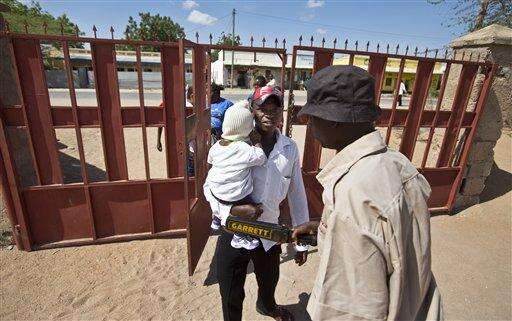
In this photo taken Sunday, Nov. 8, 2015, a Catholic churchgoer holding a baby is checked with a metal detector by a security guard as he enters the courtyard of the Our Lady of Consolation Church in Garissa, eastern Kenya. This Kenyan town in which Islamic extremists killed nearly 150 at a college of mostly Christian students in April offers a snapshot of what France and Lebanon, both targeted in recent attacks, and other countries face - the challenge of harmonizing Christian-Muslim relations at a time of danger from extremists - an issue that Pope Francis is expected to address during his trip Nov. 25-30 to Kenya, Uganda and the Central African Republic. (AP Photo/Ben Curtis)
The Associated Press
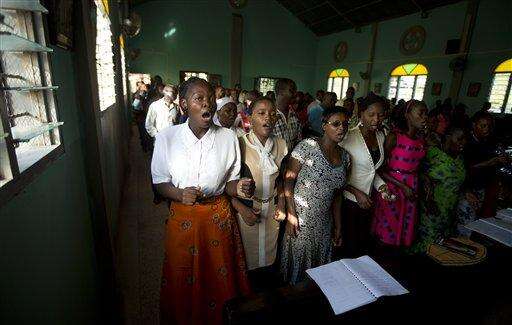
In this photo taken Sunday, Nov. 8, 2015, women in the choir sing during a service at the St. Peterâs Catholic Church in Garissa, Kenya. This Kenyan town in which Islamic extremists killed nearly 150 at a college of mostly Christian students in April offers a snapshot of what France and Lebanon, both targeted in recent attacks, and other countries face - the challenge of harmonizing Christian-Muslim relations at a time of danger from extremists - an issue that Pope Francis is expected to address during his trip Nov. 25-30 to Kenya, Uganda and the Central African Republic. (AP Photo/Ben Curtis)
The Associated Press
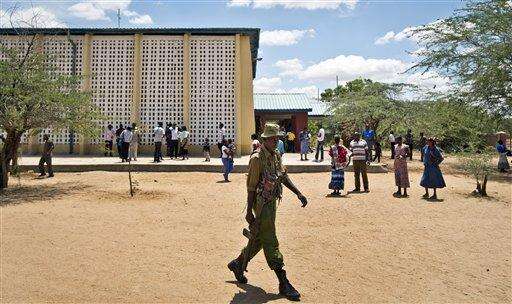
In this photo taken Sunday, Nov. 8, 2015, an armed member of Kenya's security forces patrols in the courtyard as Catholic churchgoers leave after the service, at the Our Lady of Consolation Church in Garissa, eastern Kenya. This Kenyan town in which Islamic extremists killed nearly 150 at a college of mostly Christian students in April offers a snapshot of what France and Lebanon, both targeted in recent attacks, and other countries face - the challenge of harmonizing Christian-Muslim relations at a time of danger from extremists - an issue that Pope Francis is expected to address during his trip Nov. 25-30 to Kenya, Uganda and the Central African Republic. (AP Photo/Ben Curtis)
The Associated Press
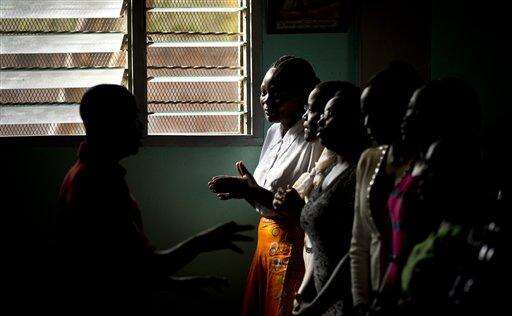
In this photo taken Sunday, Nov. 8, 2015, women in the choir pray and sing during a service at the St. Peterâs Catholic Church in Garissa, Kenya. This Kenyan town in which Islamic extremists killed nearly 150 at a college of mostly Christian students in April offers a snapshot of what France and Lebanon, both targeted in recent attacks, and other countries face - the challenge of harmonizing Christian-Muslim relations at a time of danger from extremists - an issue that Pope Francis is expected to address during his trip Nov. 25-30 to Kenya, Uganda and the Central African Republic. (AP Photo/Ben Curtis)
The Associated Press

In this photo taken Monday, Nov. 9, 2015, Kenyan Muslim women wearing niqabs walk through a street market in Garissa, eastern Kenya. This Kenyan town in which Islamic extremists killed nearly 150 at a college of mostly Christian students in April offers a snapshot of what France and Lebanon, both targeted in recent attacks, and other countries face - the challenge of harmonizing Christian-Muslim relations at a time of danger from extremists - an issue that Pope Francis is expected to address during his trip Nov. 25-30 to Kenya, Uganda and the Central African Republic. (AP Photo/Ben Curtis)
The Associated Press

In this photo taken Monday, Nov. 9, 2015, Kenyan Muslim men finish making afternoon prayers at the Ibnu-qeym Mosque in Garissa, Kenya. This Kenyan town in which Islamic extremists killed nearly 150 at a college of mostly Christian students in April offers a snapshot of what France and Lebanon, both targeted in recent attacks, and other countries face - the challenge of harmonizing Christian-Muslim relations at a time of danger from extremists - an issue that Pope Francis is expected to address during his trip Nov. 25-30 to Kenya, Uganda and the Central African Republic. (AP Photo/Ben Curtis)
The Associated Press
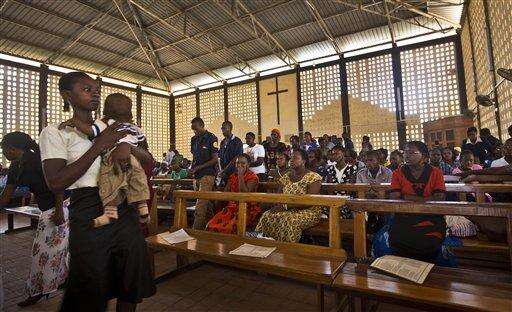
In this photo taken Sunday, Nov. 8, 2015, Kenyan Catholics attend a service at the Our Lady of Consolation Church in Garissa, eastern Kenya. This Kenyan town in which Islamic extremists killed nearly 150 at a college of mostly Christian students in April offers a snapshot of what France and Lebanon, both targeted in recent attacks, and other countries face - the challenge of harmonizing Christian-Muslim relations at a time of danger from extremists - an issue that Pope Francis is expected to address during his trip Nov. 25-30 to Kenya, Uganda and the Central African Republic. (AP Photo/Ben Curtis)
The Associated Press
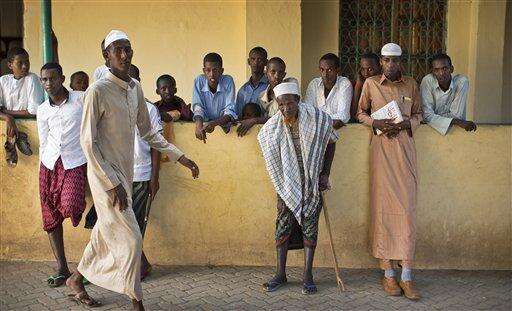
In this photo taken Sunday, Nov. 8, 2015, Kenyan Muslim boys and men stand outside following afternoon prayers at the Taqwa mosque in Garissa, eastern Kenya. This Kenyan town in which Islamic extremists killed nearly 150 at a college of mostly Christian students in April offers a snapshot of what France and Lebanon, both targeted in recent attacks, and other countries face - the challenge of harmonizing Christian-Muslim relations at a time of danger from extremists - an issue that Pope Francis is expected to address during his trip Nov. 25-30 to Kenya, Uganda and the Central African Republic. (AP Photo/Ben Curtis)
The Associated Press
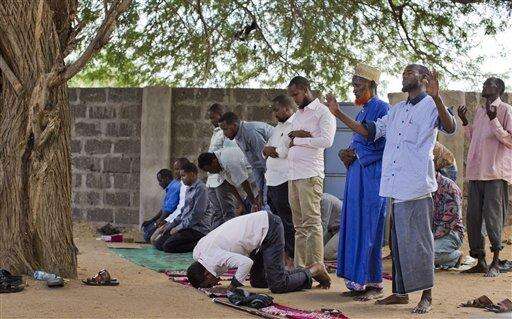
In this photo taken Monday, Nov. 9, 2015, Kenyan Muslim men make afternoon prayers in the courtyard of the Ibnu-qeym Mosque in Garissa, Kenya. This Kenyan town in which Islamic extremists killed nearly 150 at a college of mostly Christian students in April offers a snapshot of what France and Lebanon, both targeted in recent attacks, and other countries face - the challenge of harmonizing Christian-Muslim relations at a time of danger from extremists - an issue that Pope Francis is expected to address during his trip Nov. 25-30 to Kenya, Uganda and the Central African Republic. (AP Photo/Ben Curtis)
The Associated Press
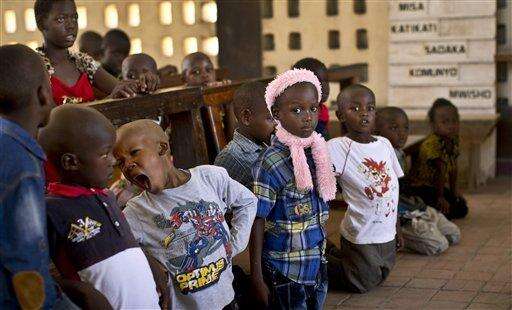
In this photo taken Sunday, Nov. 8, 2015, young Kenyan Catholic boys line the front pew during a service at the Our Lady of Consolation Church in Garissa, eastern Kenya. This Kenyan town in which Islamic extremists killed nearly 150 at a college of mostly Christian students in April offers a snapshot of what France and Lebanon, both targeted in recent attacks, and other countries face - the challenge of harmonizing Christian-Muslim relations at a time of danger from extremists - an issue that Pope Francis is expected to address during his trip Nov. 25-30 to Kenya, Uganda and the Central African Republic. (AP Photo/Ben Curtis)
The Associated Press
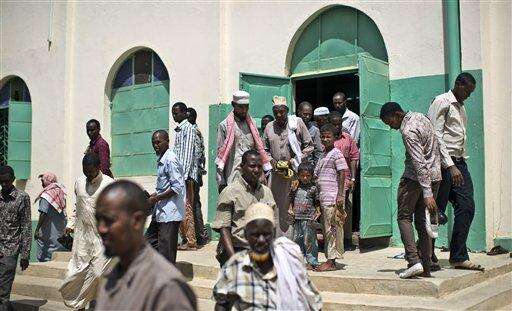
In this photo taken Monday, Nov. 9, 2015, Kenyan Muslim men leave after making afternoon prayers at the Ibnu-qeym Mosque in Garissa, Kenya. This Kenyan town in which Islamic extremists killed nearly 150 at a college of mostly Christian students in April offers a snapshot of what France and Lebanon, both targeted in recent attacks, and other countries face - the challenge of harmonizing Christian-Muslim relations at a time of danger from extremists - an issue that Pope Francis is expected to address during his trip Nov. 25-30 to Kenya, Uganda and the Central African Republic. (AP Photo/Ben Curtis)
The Associated Press
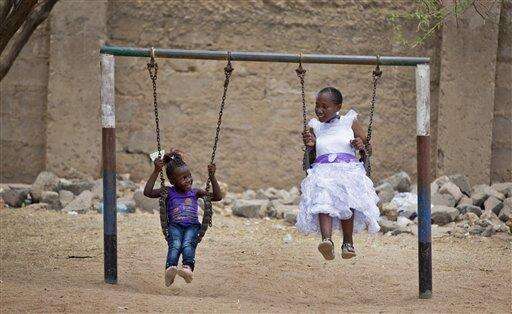
In this photo taken Sunday, Nov. 8, 2015, two young Kenyan Catholic girls play on swings after the service, in the courtyard of the Our Lady of Consolation Church in Garissa, eastern Kenya. This Kenyan town in which Islamic extremists killed nearly 150 at a college of mostly Christian students in April offers a snapshot of what France and Lebanon, both targeted in recent attacks, and other countries face - the challenge of harmonizing Christian-Muslim relations at a time of danger from extremists - an issue that Pope Francis is expected to address during his trip Nov. 25-30 to Kenya, Uganda and the Central African Republic. (AP Photo/Ben Curtis)
The Associated Press
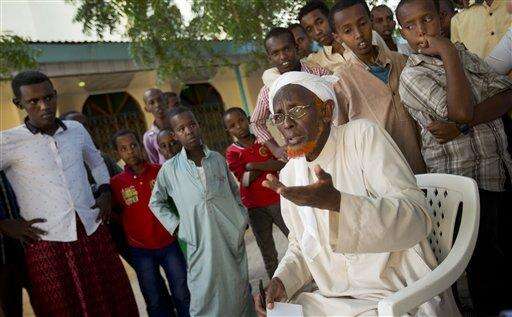
In this photo taken Sunday, Nov. 8, 2015, Kenyan Muslim activist Hassan Sheikh Ali speaks to an Associated Press reporter following afternoon prayers at the Taqwa mosque in Garissa, eastern Kenya. This Kenyan town in which Islamic extremists killed nearly 150 at a college of mostly Christian students in April offers a snapshot of what France and Lebanon, both targeted in recent attacks, and other countries face - the challenge of harmonizing Christian-Muslim relations at a time of danger from extremists - an issue that Pope Francis is expected to address during his trip Nov. 25-30 to Kenya, Uganda and the Central African Republic. (AP Photo/Ben Curtis)
The Associated Press